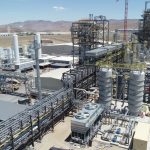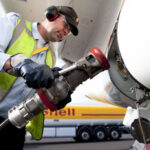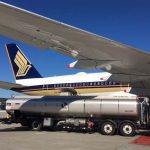Three significant new agreements have been announced to collectively deliver more than 1.5 billion litres of sustainable aviation fuel to seven airline operators, reports Tony Harrington. German-based freight airline DHL Express has agreed to acquire more than 800 million litres of SAF within the next five years through two agreements, one with oil company bp and the other with wastes-to-fuel producer Neste. The carrier described the combined SAF deals as one of the largest in aviation to date. In a simultaneous development, the oneworld airline alliance has announced the intention of six of its 14-member airlines to jointly acquire almost the same amount – up to 200 million gallons, or around 750 million litres – of SAF from US-based renewable fuels provider Gevo for use in key Californian airports from 2027. And in the UK, the Saudi Arabian industrial group Alfanar has announced a £1 billion ($1.3bn) investment in a new waste-to-energy project to produce up to 180 million litres of SAF per year.
DHL Express said the bp and Neste deals would provide SAF from both suppliers until 2026, sufficient to sustainably fuel 1,000 Boeing 777 freight flights per year for 12 years, between Leipzig, Germany, and Cincinnati, USA, and cutting CO2 emissions on a lifecycle basis equivalent to the annual greenhouse gas emissions of 400,000 passenger cars. Together with a previous commitment to introduce SAF to its operations in San Francisco, Amsterdam and East Midlands, UK, the latest agreements by DHL Express will exceed 50% of its target to achieve 10% SAF blending for all of its air transport by 2026.
“Using SAF is currently one of the aviation industry’s key routes to reducing CO2 emissions over the aviation fuel lifecycle with currently-available aircraft types,” said Frank Appel, CEO of Deutsche Post DHL Group, which has committed to using 30% SAF blending for all of its air transport by 2030. DHL Express CEO John Pearson highlighted continuing concerns in the aviation industry about the global shortage of SAF. “Our key focus is to inspire more SAF suppliers to address the current supply gap,” he said. “At the same time, we are calling on policy-makers to set the right framework to accelerate market ramp-up of SAF in the EU and worldwide, including an accounting mechanism that allows flexible SAF purchases and usage.”
Air bp SVP Martin Thomsen said the company was intensifying its partnerships with airports and airlines to help them decarbonise. “As bp transitions to an integrated energy company, we are leveraging our value chain encompassing feedstocks, global production, logistics and airport infrastructure,” he reported. “We are promoting SAF at pace to support global aviation to realise its lower carbon emissions.”
Peter Vanacker, CEO of Finland-based Neste, added: “This milestone agreement, our largest ever for SAF, underlines the growing need and urgency – as well as the commitment – to act on aviation-related emissions. SAF is a cornerstone of the aviation industry’s efforts to achieve net zero emissions by 2050. It requires a joint effort across the aviation value chain with all stakeholders, using all available raw materials and solutions, to reach that goal.”
In the US, the oneworld airline alliance has announced a plan for six of its members – Alaska Airlines, American Airlines, British Airways, Finnair, Japan Airlines and Qatar Airways – to collectively acquire up to 200 million gallons of SAF per year at a range of airports in California, for five years from 2027. The fuel will be sourced from Colorado-based renewable fuels producer Gevo and made from inedible corn products, processed to create ethanol, then converted to SAF. The RSB-certified fuel will be supplied to airports including Los Angeles, San Francisco, San Diego and San Jose from three new facilities under development in the US Midwest.
The Gevo deal is the second to be announced by oneworld within five months. Last November, the alliance revealed a joint commitment by most of its member airlines to purchase more than 350 million gallons (1.34 billion litres) of blended sustainable aviation fuel from another supplier, Aemetis, for uplift from San Francisco.
The Chairman of oneworld, Qatar Airways Group Chief Executive Akbar Al Baker, said the latest deal “reaffirms the leadership of our alliance in supporting the ambitious aviation decarbonisation targets, as well as our active role in driving the use of ICAO-recognised SAF at a commercial scale.” Rob Gurney, CEO of oneworld, added: “Five months ago, we committed as an alliance to a target of 10% sustainable aviation fuel by 2030. A second major sustainable aviation fuel offtake among member airlines builds further upon that commitment, while demonstrating the value that can be delivered when our member airlines work together.”
Gevo said it had developed two alcohol-to-jet methods which would use a variety of feedstocks produced using sustainable farming and renewable agricultural techniques. The company said its production processes would incorporate renewable energy from sources including wind turbines, biogas and combined heat and power systems (CHP) to boost efficiency and cut carbon intensity to net zero. “When oneworld member airlines show they understand the importance of reducing fossil-carbon greenhouse gas emissions, they start making real change in the industry,” said Gevo CEO Dr Patrick Gruber.
In yet another development, the Saudi Arabian industrial group Alfanar is to invest £1 billion in delivering the UK’s first commercial-scale production plant for sustainable aviation fuel. The Lighthouse Green Fuels project in the Tees Valley, north-east England, is expected to produce up to 180 million litres of SAF per year from converted British domestic and commercial waste. It will do so through a waste-to-liquid process which uses gasification and Fischer-Tropsch technology to convert refuse which otherwise would be incinerated or used as landfill.
The project follows a £2.4 million award to Alfanar last year as part of the UK government’s ‘Green Fuels, Green Skies’ competition to support domestic SAF production. British Prime Minister Boris Johnson announced the Alfanar investment during a visit to the Arabian Gulf, where he met with the leaders of both Saudi Arabia and the United Arab Emirates to discuss increased oil procurement to replace supplies previously sourced from Russia.
The Lighthouse Green Fuels project also complements the establishment in Teesside of the UK’s first Hydrogen Transport Hub, a partnership with Teesside University to create an innovation centre focused on clean energy research, development and testing for all modes of transport. Tees Valley Mayor Ben Houchen said the Saudi SAF development, in addition to creating 700 construction jobs and another 240 positions once the plant was operational, “further cements our region as the global go-to place to develop ground-breaking green energy technology.”
It is also aligned with the region’s ambitions for Teesside Airport to become “the UK’s first hydrogen-ready airport, and an early adopter of these sustainable aviation fuels,” he said. A hydrogen refuelling station has already been established at the airport as part of a trial across the region, and a number of organisations are testing hydrogen-powered commercial and support vehicles, with more to be introduced.
Image: DHL Express















More News & Features
Lessons learned from the collapse of Fulcrum BioEnergy
Early data shows uncertainty that UK SAF mandate can be met in its first year
Swiss advanced SAF technology startups Metafuels and Synhelion reach project milestones
PtX fuels have significant Asia-Pacific potential but face many barriers, finds report
Airfreight giants DHL Express and FedEx announce big US SAF deals
Asia-Pacific study reveals pessimistic outlook for SAF uptake by 2030 as Singapore details levy